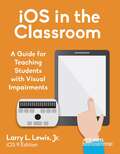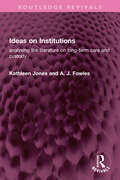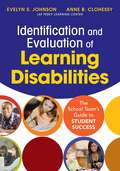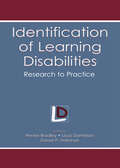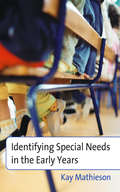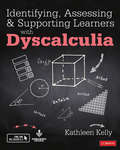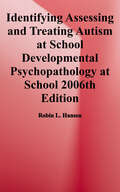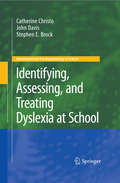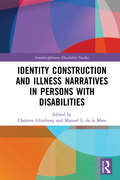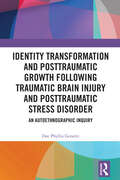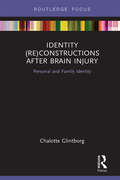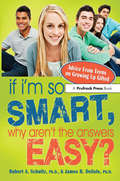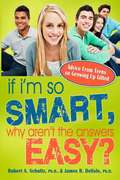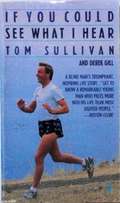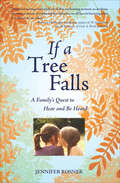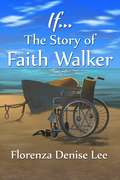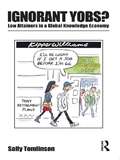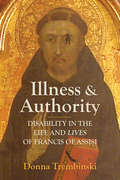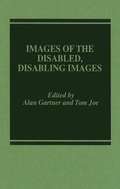- Table View
- List View
IOS in the Classroom: A Guide for Teaching Students with Visual Impairments
by Larry L. Lewis Jr.iOS in the Classroom is a fully illustrated step-by-step guide to teaching the use of the iPad running iOS 9 to students with visual impairments. The book explores the extensive accessibility options available, where to find them, and how to configure them. It delves into VoiceOver and Zoom, the use of external keyboards and refreshable braille displays, as well as a discussion on touch screen gestures and braille chord commands. Also included is information on finding and managing content, using the iPad for a range of online activities, and utilizing specific apps, all geared to enabling students with visual impairments to use the iPad for the same classroom tasks as their peers and ensuring their success in the classroom.
Ideas on Institutions: analysing the literature on long-term care and custody (Routledge Revivals)
by Kathleen Jones A J FowlesFirst published in 1984, Ideas on Institution is a review of the major English-language literature of the past two decades on the experience of living in institutions - hospitals, mental hospitals, prisons. The survey opens with a consideration of the writings of Erving Goffman, Michael Foucault, and Thomas Szasz. They shattered the liberal consensus that the purpose of imprisonment was to reform. Instead, their work argued that the purpose of prisons and mental hospitals was social control, and that prisons created criminals, and mental facilities created mental illness. Part II looks at four British studies : Russell Barton's Institutional Neurosis which suggested the existence of a new disease entity; Peter Townsend's The Last Refuge, a study of old people in residential care; The Morrisses’ Pentonville, a study of a London prison which became a classic in criminology; and Sans Everything, a symposium which paved the way for a series of official hospital enquiries in the 1970s. Part III examines David Rothman's two historical studies on how and why the U.S. constructed institutions, and how and why reform movements failed; N.N. Kittrie's The Right to be Different, a wide-ranging attack on the compulsory treatment of a variety of 'deviants', including the mentally ill, juvenile delinquents and drug abusers; Cohen and Taylor's Psychological survival, a disturbing analysis of the lives of long-term prisoners in a maximum security wing; Zimbardo's Stanford Prison Experiment on the malignant effects of prison conditions on the personalities of both prisoners and their guards; and King and Elliott's study of Albany Prison, showing how a promising therapeutic experiment went wrong. This book will be of interest to students of history, gerontology, sociology, social policy, penology, psychology and political science.
Identification and Evaluation of Learning Disabilities: The School Team’s Guide to Student Success
by Evelyn S. Johnson Anne B. ClohessyEnsure that your students have the support they need! When it comes to designing instruction for students with learning disabilities, one size does not fit all — and that’s also true for identifying and evaluating learning disabilities. Theories and legislation aside, it’s critical for your school team to have a comprehensive plan to make sure every child gets the right kind of attention—and no one falls through the cracks. This compelling, easy-to-use handbook guides general educators, special educators, administrators, and school psychologists through the eligibility and evaluation stages to ensure that students get the best services and interventions they need to be successful. You’ll find: Guidance on what data to collect and how to collect it Strategies for combining RTI with a comprehensive evaluation to diagnose SLD Detailed case studies—with graphs, figures, and test scores—at the school, classroom, and individual student level Everyone on your team has the same goal: to help students with learning challenges achieve success. This comprehensive resource has the tools you need to make that happen. "This book reminds educators that we are responsible for all of our students. When students are not making the progress we expect, this text offers very specific, practical suggestions that educators can follow. This book helps to identify if a student has a specific learning disability and offers suggestions for addressing the student’s difficulty through a team approach. When using the case studies, teachers will see many examples related to their own students and find new resources to try in their classrooms that will assist those who are having difficulty making significant progress." —Marcia B. Imbeau, Professor University of Arkansas
Identification and Evaluation of Learning Disabilities: The School Team’s Guide to Student Success
by Evelyn S. Johnson Anne B. ClohessyEnsure that your students have the support they need! When it comes to designing instruction for students with learning disabilities, one size does not fit all — and that’s also true for identifying and evaluating learning disabilities. Theories and legislation aside, it’s critical for your school team to have a comprehensive plan to make sure every child gets the right kind of attention—and no one falls through the cracks. This compelling, easy-to-use handbook guides general educators, special educators, administrators, and school psychologists through the eligibility and evaluation stages to ensure that students get the best services and interventions they need to be successful. You’ll find: Guidance on what data to collect and how to collect it Strategies for combining RTI with a comprehensive evaluation to diagnose SLD Detailed case studies—with graphs, figures, and test scores—at the school, classroom, and individual student level Everyone on your team has the same goal: to help students with learning challenges achieve success. This comprehensive resource has the tools you need to make that happen. "This book reminds educators that we are responsible for all of our students. When students are not making the progress we expect, this text offers very specific, practical suggestions that educators can follow. This book helps to identify if a student has a specific learning disability and offers suggestions for addressing the student’s difficulty through a team approach. When using the case studies, teachers will see many examples related to their own students and find new resources to try in their classrooms that will assist those who are having difficulty making significant progress." —Marcia B. Imbeau, Professor University of Arkansas
Identification of Learning Disabilities: Research To Practice (The LEA Series on Special Education and Disability)
by Daniel P. Hallahan Louis Danielson Renée BradleyIdentification of Learning Disabilities: Research to Practice is the remarkable product of a learning disabilities summit conference convened by the Office of Special Education Programs (OSEP) in August 2001 and the activities following that summit. Both the conference and this book were seen as important preludes to congressional reauthorization of the historic Individuals With Disabilities Education Act (IDEA) scheduled for 2002 and subsequent decision making surrounding implementation. The OSEP conference brought together people with different perspectives on LD (parents, researchers, practitioners, and policymakers) and resulted in this book, which examines the research on nine key issues concerning the identification of children with learning disabilities. Coverage includes alternative responses to treatment, classification approaches, processing deficit models, and approaches to decision making. Chapter Structure-- Each of the first nine chapters is organized around a lengthy, issue-oriented paper, which presents the most current research on that topic. These primary papers are then followed by four respondent papers that reflect a variety of viewpoints on the topic. Summarizing Chapter -- A small group of researchers (listed in the final chapter) dedicated an enormous amount of time to summarizing the research and developing key consensus statements regarding the identification of children with learning disabilities. Their work is sure to have a tremendous impact on future discussions in this area. Expertise-- The following well-known scholars have helped summarize the vast amount of research presented in this book as well as the consensus statements derived therefrom: Lynne Cook, Don Deshler, Doug Fuchs, Jack M. Fletcher, Frank Gresham, Dan Hallahan, Joseph Jenkins, Kenneth Kavale, Barbara Keogh, Margo Mastopieri, Cecil Mercer, Dan Reschley, Rune Simeonsson, Joe Torgesen, Sharon Vaughn, and Barbara Wise.
Identifying Special Needs in the Early Years
by Kay MathiesonWith increasing expectations from parents and practitioners for inclusive early years settings, many practitioners are anxious about identifying and accommodating children′s individual needs as early as possible. Through simple step-by-step instruction, this book will: o increase practitioners′ confidence in identifying individual needs; o give practical advice on involving parents; o provide clear links to existing guidance and legislation. This is a valuable guide for practitioners in all early years settings including Day Nurseries, Pre-schools, Children′s Centres, Nursery Schools and infant schools.
Identifying and Nurturing Math Talent
by M. Katherine GavinNow more than ever, we must cultivate top-notch mathematicians in order to address the needs, issues, and problems of the 21st century. Identifying and Nurturing Math Talent provides information for teachers, administrators, and parents interested in identifying and supporting mathematical talent in children and adolescents. This book offers practical advice on identifying mathematical talent, developing rigorous mathematics curricula, preparing highly qualified teachers, and locating specialized programs and schools in order to support the learning requirements of mathematically talented students.
Identifying and Supporting Children with Specific Learning Difficulties: Looking Beyond the Label to Support the Whole Child
by Christine Macintyre Pamela DeponioMany children experience difficulties which impact on their learning at home and school. Some children are considered to have a specific learning difficulty such as dyslexia or dyspraxia, but other children display a range of indicators which cross the boundaries of specific named 'conditions'. If teachers are to offer appropriate support, the authors of this highly practical book argue that they must look beyond the label to assess the whole child. This is an informative book which: * encourages teachers to consider children as individuals rather than attempting to match them to existing sets of indicators * pinpoints the overlap of indicators within different specific learning difficulties * considers the process of assessment* explains the implications of the children's difficulties* offers tried-and-tested strategies to promote inclusive learning. Teachers, teaching assistants, Special Educational Needs Co-ordinators and students undertaking teacher education courses will all find this a refreshingly accessible book.
Identifying, Assessing and Supporting Learners with Dyscalculia (Corwin Ltd)
by Kathleen Kelly***** Online Resources are open access. No code is required ***** It is vital to understand the challenges and provide the right support for learners with dyscalculia and specific learning difficulties in mathematics. The book provides: • an overview of current research explaining the nature and causation of dyscalculia • guidance on the identification of dyscalculia • examples of how to carry out informal and formal assessments • an explanation of the principles of multisensory mathematics teaching • an outline of a structured programme (for learners aged 5-14), together with examples of lesson planning and activities. Designed for teachers specialising in the assessment and teaching of learners with dyscalculia, and those undertaking courses leading to Approved Teacher Dyscalculia (ATD) and Associate Membership of the British Dyslexia Association (AMBDA), the book is useful to any professional looking for an understanding of this area of specific difficulty.
Identifying, Assessing and Supporting Learners with Dyscalculia (Corwin Ltd)
by Kathleen Kelly***** Online Resources are open access. No code is required ***** It is vital to understand the challenges and provide the right support for learners with dyscalculia and specific learning difficulties in mathematics. The book provides: • an overview of current research explaining the nature and causation of dyscalculia • guidance on the identification of dyscalculia • examples of how to carry out informal and formal assessments • an explanation of the principles of multisensory mathematics teaching • an outline of a structured programme (for learners aged 5-14), together with examples of lesson planning and activities. Designed for teachers specialising in the assessment and teaching of learners with dyscalculia, and those undertaking courses leading to Approved Teacher Dyscalculia (ATD) and Associate Membership of the British Dyslexia Association (AMBDA), the book is useful to any professional looking for an understanding of this area of specific difficulty.
Identifying, Assessing, and Treating Autism at School (Developmental Psychopathology At School Ser.)
by Robin L. HansenThere is no other recently published book on this topic dedicated to school psychologists and other educational professionals. Focuses on the assessment, identification, and treatment of students in the school context. Unlike competing works, this would be an authored (not edited) volume and will, therefore, be much more focused and specific.- This book will be very practical and applied in its orientation. It will give readers direction that they can immediately follow in their school-based practice.- This book will clearly identifies the roles and responsibilities of educational professionals and school psychologists in identification of students with autism.
Identifying, Assessing, and Treating Bipolar Disorder at School
by Stephen E. Brock Shelley R. Hart Ida JeltovaIdentifying, Assessing, and Treating Bipolar Disorder at School presents child and education practitioners with an evidence-based framework for accurate identification, assessment, and intervention of bipolar disorder. This straightforward resource clears up misconceptions about the condition, and outlines its complex presentation in young people, where it may appear in tandem with other disorders and bring challenges to treatment. By providing information to assist in referrals, consultations, and recommendations for special education, the authors give the reader a unique vantage point for improving students' learning environment and helping to facilitate the work of fellow professionals. Among the topics: Prevalence and associated conditions. Case finding, screening, and referrals. Diagnostic and psycho-educational assessment Treatment of bipolar disorder in children and adolescents. Plus suggested resources to assist students and their families. Identifying, Assessing, and Treating Bipolar Disorder at School is an essential reference for school psychologists and allied educational professionals, special education teachers, speech and language therapists, counselors, clinical child psychologists, and mental health practitioners.
Identifying, Assessing, and Treating Dyslexia at School
by John M. Davis Catherine Christo Stephen E. BrockAs many as one in four children experiences problems with reading. Dyslexia, the most common learning disability leads to well-documented negative effects on school and, ultimately, adult success. Therefore, it is critical that school professionals provide early and effective assessment and intervention. Identifying, Assessing, and Treating Dyslexia at School equips practitioners with in-depth understanding of the disorder and a wealth of practical information for meeting student needs. This volume: Reviews up-to-date findings on dyslexia - causes, prevalence, and related conditions. Provides research-based tools for identifying and addressing dyslexia. Offers a detailed framework for case finding and screening, diagnostic and psychoeducational assessment as well as age- and grade-appropriate intervention. Explains the roles and responsibilities of school psychologists when it comes to identifying students with dyslexia. Focuses solely on dyslexia, unlike most other books on learning disabilities. As the duties of school psychologists and related education professionals become more complex, recognizing and providing services for students with learning disorders has become progressively more demanding. Identifying, Assessing, and Treating Dyslexia at School offers practitioners an accessible and easy-to-read reference that they will use for years to come.
Identity Construction and Illness Narratives in Persons with Disabilities (Interdisciplinary Disability Studies)
by Chalotte GlintborgThis book investigates how being diagnosed with various disabilities impacts on identity. Once diagnosed with a disability, there is a risk that this label can become the primary status both for the person diagnosed as well as for their family. This reification of the diagnosis can be oppressive because it subjugates humanity in such a way that everything a person does can be interpreted as linked to their disability. Drawing on narrative approaches to identity in psychology and social sciences, the bio-psycho-social model and a holistic approach to disabilities, the chapters in this book understand disability as constructed in discourse, as negotiated among speaking subjects in social contexts, and as emergent. By doing so, they amplify voices that may have otherwise remained silent and use storytelling as a way of communicating the participants' realities to provide a more in-depth understanding of their point of view. This book will be of interest to all scholars and students of disability studies, sociology, medical humanities, disability research methods, narrative theory, and rehabilitation studies.
Identity Transformation and Posttraumatic Growth Following Traumatic Brain Injury and Posttraumatic Stress Disorder: An Autoethnographic Inquiry
by Dee Phyllis GenettiIdentity Transformation and Posttraumatic Growth Following Traumatic Brain Injury and Posttraumatic Stress Disorder provides an autoethnographic qualitative study that portrays the author’s recovery from a devastating life-changing event – a car crash resulting in the hybrid diagnosis of traumatic brain injury (TBI) and posttraumatic stress disorder (PTSD), leading to posttraumatic growth ( PTG) and identity transformation over a ten-year recovery period. In so doing, the text offers a comprehensive literature review on TBI, PTSD, PTG and disability culture. Throughout, the author explores whether growth (PTG) and distress (PTSD) and whether TBI and PTSD can co-exist. Having lost her ability to read and write, the author had to learn how to learn, to heal and to have faith again. As a licensed trauma therapist and researcher, she collected self-observational data by writing her actual behaviors, thoughts and emotions in real time, both in a field and a process journal, even before she could write in full sentences. The many symptoms and co-morbidities of TBI and PTSD and the tenets of PTG are portrayed as they evolved in recovery showing the behaviors and characteristics of each. The text refers to actual journal entries, medical records and clinical notes from rehabilitation specialists, alternating between her clinical analysis and interpretation. The findings show that tragedy and suffering can lead to growth and positive change (PTG) after TBI, even though the precipitating trauma and psychological distress (PTSD) may persist for years. Changes are seen in self-perception, interpersonal relationships and philosophies of life. This chronicled account of the author’s emergent recovery from patient to doctor is intended to benefit neuro-rehabilitation service providers (neuropsychologists, primary care physicians, speech-language pathologists) and also mental health clinicians who can see the evolution of PTG for what is now the new next step for many in PTSD recovery.
Identity: Personal and Family Identity (Interdisciplinary Disability Studies)
by Chalotte GlintborgIdentity (Re)constructions After Brain Injury: Personal and Family Identity investigates how being diagnosed with acquired brain injury (ABI) impacts identity (re)construction in both adults with ABI and their close relatives. To show how being diagnosed with ABI impacts identity (re)construction, this book investigates key patterns of identity construction. Discourse analysis, especially on the concept of positioning, provides an understanding of the changes and developmental processes in these self-narratives. These narrative (re)constructions point to a developmental change of identity in the course of the different phases of the recovery process for both persons with ABI and their relatives, including conflicting voices from society, service providers, relatives, and other adults with ABI. In addition, the (re)construction process is characterized by much ambivalence in both ABI survivors and relatives. Three perspectives are triangulated: (1) an insider perspective from ABI survivors; (2) an insider perspective from relatives; and (3) an outsider perspective from the researchers. This allows us to see how identities are negotiated and constructed in concrete situations. This innovative book will be required reading for all students and academics working in the fields of disability studies, rehabilitation psychology, sociology, allied health, and social care.
If I'm So Smart, Why Aren't the Answers Easy?: Advice From Teens On Growing Up Gifted
by Robert A. Schultz James DelisleBased on surveys with more than 5,000 gifted young adults, If I'm So Smart, Why Aren't the Answers Easy? sheds light on the day-to-day experiences of those growing up gifted. In their own enlightening words, teens share their experiences with giftedness, including friendships and fitting in with peers, school struggles and successes, and worries about the future. By allowing teens to share their real-life stories, the book gives readers a self-study guide to the successes and pitfalls of being gifted in a world not always open to their unique and diverse needs. Teens will be able to reflect on their own experiences through the engaging journal prompts included in the book, and their parents and teachers will enjoy hearing directly from other students about the topics gifted teens face daily. Grades 6-10
If I'm so Smart, why aren't the answers Easy?: Advice from Teens on Growing Up Gifted
by Robert A. Schultz James R. DelisleBased on surveys with more than 5,000 gifted young adults, If I m So Smart, Why Aren t the Answers Easy? sheds light on the day-to-day experiences of those growing up gifted. In their own enlightening words, teens share their experiences with giftedness, including friendships and fitting in with peers, school struggles and successes, and worries about the future. By allowing teens to share their real-life stories, the book gives readers a self-study guide to the successes and pitfalls of being gifted in a world not always open to their unique and diverse needs. Teens will be able to reflect on their own experiences through the engaging journal prompts included in the book, and their parents and teachers will enjoy hearing directly from other students about the topics gifted teens face daily.
If We Could Hear The Grass Grow
by Eleanor CraigFrom the book: "Each day I saw more clearly what I wanted. To have a day camp for troubled children. And spend one last summer with my children in this house. A final chance to reweave more smoothly the family ties that bound us." It was a summer that will touch your heart. Now, in the same honest, thoughtful style that made her previous book, P.S. Your Not Listening, so successful, Eleanor Craig, gifted family therapist, teacher, and author, tells the wonderfully moving true story of her experiences running a day camp for emotionally disturbed children at her Connecticut home. If We Could Hear the Grass Grow is a funny, sad, fascinating account of what it's really like to cope and communicate with severely antisocial children on a day-to-day basis, deal with their violence, help ease their pain, and free their astonishing often hidden-capacity for love and sharing. Eleanor Craig shows us how these seemingly unreachable children can be reached and, most important, can achieve remarkable growth when handled by a committed, sensitive teacher. Among her "special kids" are: Rodney, the "Big Man," older than his years, tough, uncontrollably aggressive, and as much in need of love as of discipline. Maria, sweet, undemanding, and troubled, one of a large Hispanic family where the father has a history of manic depression and of being physically abusive. She spends much of her time in fervent prayer. Frankie, overweight and immature, who acts out his mother's agoraphobia by refusing to leave her side, day or night. Adam, abandoned by his young, mentally ill mother, and unable to communicate except in comic book babble.
If You Could See What I Hear: A Blind Man's Triumphant, Inspiring Life Story
by Tom Sullivan Derek L. GillThis memoir traces the life of Tom Sullivan from premature birth to age 26. Born blind from too much oxygen in his preemie incubator, he is alternately overprotected and set loose. His parents both encourage and hinder him. Mr Sullivan graduates from Perkins School for the Blind with many records, including most number of suspensions. He eventually graduates from Harvard, and pursues a life with music. He marries and has two children.
If a Tree Falls: A Family's Quest to Hear and Be Heard
by Jennifer RosnerA revealing memoir of a family and a &“wrenching journey into deafness from the standpoint of a mother, a wife, a daughter, a philosopher, and a Jew&” (Ilan Stavans, author of On Borrowed Words: A Memoir of Language). When her daughters were born deaf, Jennifer Rosner was stunned. Then she discovered a hidden history of deafness in her family, going back generations to the Jewish enclaves of Eastern Europe. Traveling back in time in her mind, she imagined her silent relatives, who showed surprising creativity in dealing with a world that preferred to ignore them. Here, in a &“gentle meditation on sound and silence, love and family&” Rosner shares her journey into the modern world of deafness, and the controversial decisions she and her husband made about hearing aids, cochlear implants and sign language (Publishers Weekly). Punctuated by memories of being unheard, Rosner&’s imaginative odyssey of dealing with her daughters&’ deafness is at its heart a story of whether she—a mother with perfect hearing—can ever truly hear her children.
If…The Story of Faith Walker: The Story Of Faith Walker
by Florenza LeeImani is unlike other girls her age.Due to developing meningitis at birth, she received a life-saving surgery that resulted in her being a wheelchair user.This, however, has not hindered her from being an active, outgoing, caring young lady. While in Children’s Church, Matthew 14 catches her attention; it is the account of Peter walking on water. Imani is unsure as to why the story continues to speak to her heart, “Lord, if it is you, tell me to come to you on the water.” No matter what Imani does, she simply cannot shake the feeling that there is a message calling out to her from these verses. She feels as though she is on a quest to find clues to a puzzle she didn't even know existed. Do the verses mean she will one day walk again, or something else? Imani isn’t entirely sure; all she knows is she is about to have a faith walk, unlike any other.ABOUT ITIF…THE STORY OF FAITH WALKER This book demonstrates that faith may be utilized in every area of our lifes.
Ignorant Yobs?: Low Attainers In A Global Knowledge Economy
by Sally TomlinsonWhat happens to young people who are defined as lower attainers or having learning difficulties in a global knowledge economy? How do we stop those with learning difficulties or disabilities being seen as social problems or simply as consumers of resources? Governments in developed countries are driven by the belief that in a global economy all citizens should be economically productive, yet they are still not clear about the relationship between the education of low attainers and the labour market. Ignorant Yobs?: Low Attainers in a Global Knowledge Economy examines this international phenomenon, exploring how those with learning difficulties are treated in a world economy where even low-skilled jobs require qualifications. This unique book provides an examination of countries which converge on the issue of the low attaining population, despite differing on political, economic and cultural dimensions. In doing so, it considers some thorny issues at the forefront of education policy and provision: The increasing competitive stratification within education systems; The impact of governments who have put competition in the labour market at the heart of their policies; Social control of potentially disruptive groups, social cohesion and the human rights agenda; The expansion of a special education industry driven by the needs of middle class, aspirant and knowledgeable parents, anxious about the success of their ‘less able’ children. Written by an internationally renowned scholar, Ignorant Yobs?: Low Attainers in a Global Knowledge Economy synthesises a range of complex, highly topical issues and suggests how those with learning difficulties might, with government and employer support, contribute to a flexible labour market. This book, using original discussions in England, the USA, Germany, Malta and Finland, will be of interest to a wide audience of policy-makers, practitioners, administrators, and politicians, in addition to undergraduate, postgraduate and research students and academics.
Illness and Authority: Disability in the Life and Lives of Francis of Assisi
by Donna TrembinskiIllness and Authority examines the lived experience and early stories about St. Francis of Assisi through the lens of disability studies. This new approach re-centres Francis’s illnesses and infirmities and highlights how they became barriers to wielding traditional modes of masculine authority within both the Franciscan Order he founded and the church hierarchy. So concerned were members of the Franciscan leadership that the future saint was compelled to seek out medical treatment and spent the last two years of his life in the nearly constant care of doctors. Unlike other studies of Francis’s ailments, Illness and Authority focuses on the impact of his illnesses on his autonomy and secular power, rather than his spiritual authority. From downplaying the comfort Francis received from music to disappearing doctors in the narratives of his life, early biographers worked to minimize the realities of his infirmities. When they could not do so, they turned the saint’s experiences into teachable moments that demonstrated his saintly and steadfast devotion and his trust in God. Illness and Authority explores the struggles that early authors of Francis’s vitae experienced as they tried to make sense of a saint whose life did not fit the traditional rhythms of a founder-saint.
Images Of The Disabled, Disabling Images
by Alan Gartner Tom JoeThe first book of its kind, Images of the Disabled/Disabling Images combines an examination of the presentation of persons with disabilities in literature, film, and the media with an analysis of the ways in which these images are expressed in public policy concerning the disabled. <P><P> Leaders of the disability rights movement and major scholars of disability issues explore both attitudes toward the disabled, as well as the ways in which the disabling images of these attitudes are incorporated in employment, health, housing, and education policies. <P><P>Discussions include the appeal of new technological aids and new developments in community living. The first book of its kind, Images of the Disabled/Disabling Images combines an examination of the presentation of persons with disabilities in literature, film, and the media with an analysis of the ways in which these images are expressed in public policy concerning the disabled. Leaders of the disability rights movement and major scholars of disability issues explore both attitudes toward the disabled, as well as the ways in which the disabling images of these attitudes are incorporated in employment, health, housing, and education policies. Discussions include the appeal of new technological aids and new developments in community living.
